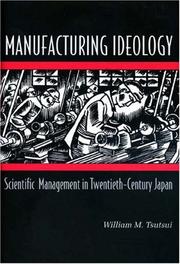| Listing 1 - 9 of 9 |
Sort by
|

ISBN: 0521142741 052164240X 0511117361 0511040342 051115609X 0511329075 0511493193 1280158905 0511051751 1107116465 9780511040344 9780511051753 9780511117367 9780511493195 9780521642408 9781280158902 9786610158904 6610158908 9781107116467 9780511329074 9780521142748 Year: 2000 Publisher: Cambridge ; New York : Cambridge University Press,
Abstract | Keywords | Export | Availability | Bookmark
 Loading...
Loading...Choose an application
- Reference Manager
- EndNote
- RefWorks (Direct export to RefWorks)
Japanese labour market practices have attracted considerable attention in the West for two reasons. Firstly, innovative human resource management (HRM) is responsible for the development of competitive industrial sectors. Secondly, inner flexibility of the labour market has produced low unemployment and wage flexibility. This study, originally published in 2000, provides a thorough investigation of the distinctive features of Japanese internal labour markets (ILM) and occupational labour markets (OLM), closely analyses important changes in ILM and considers future developments. It combines a mixture both of descriptive and of theoretical and econometric work and builds on the authors' wel- known previous research in this area. Also contains a detailed case study and the econometric analysis of HRM policies used by a large Japanese firm. Although the focus is on Japanese ILM, international comparisons are made throughout, mainly with reference to Europe and the United States.
Labor market. --- Personnel management. --- Personnel management - Japan. --- Business & Economics --- Labor & Workers' Economics --- Business, Economy and Management --- Economics --- JP / Japan - Japon --- 332.10 --- 332.691 --- Betrekkingen tussen werkgevers en werknemers. Organisatie van de arbeidsverhoudingen in de industrie: algemeenheden. --- Evolutie van de arbeidsmarkt. --- Labor market --- Personnel management --- Evolutie van de arbeidsmarkt --- Betrekkingen tussen werkgevers en werknemers. Organisatie van de arbeidsverhoudingen in de industrie: algemeenheden
Book
ISBN: 9812779566 9812779574 9789812779571 9789812779564 Year: 2008 Publisher: Hackensack, NJ World Scientific
Abstract | Keywords | Export | Availability | Bookmark
 Loading...
Loading...Choose an application
- Reference Manager
- EndNote
- RefWorks (Direct export to RefWorks)
In the interests of globalization, many companies today are establishing theories and practices for international management accounting. This book discusses the current status of international management accounting in Japan through interviews with three major electronics companies. By tracing the history of the business expansion of the three companies, as well as their transition of strategies and accompanying organizational structure, key features and details of international management accounting are faithfully described. The book is divided into two parts. Part I describes general concepts
Electronic industries -- Japan -- Accounting. --- Industrial management -- Japan. --- International business enterprises -- Japan -- Accounting. --- Managerial accounting -- Japan. --- Managerial accounting --- Industrial management --- International business enterprises --- Electronic industries --- Commerce --- Business & Economics --- Accounting --- Japan --- Accounting. --- Electronics industry --- Business enterprises, International --- Corporations, International --- Global corporations --- International corporations --- MNEs (International business enterprises) --- Multinational corporations --- Multinational enterprises --- Transnational corporations --- Japanese management --- Management accounting --- Electric industries --- Business enterprises --- Corporations --- Joint ventures --- E-books
Book
ISBN: 1283078449 9786613078445 0226719340 9780226719344 9781283078443 6613078441 9780226719320 0226719324 9780226719337 0226719332 Year: 2011 Publisher: Chicago London
Abstract | Keywords | Export | Availability | Bookmark
 Loading...
Loading...Choose an application
- Reference Manager
- EndNote
- RefWorks (Direct export to RefWorks)
Who are the agents of financial regulation? Is good (or bad) financial governance merely the work of legislators and regulators? Here Annelise Riles argues that financial governance is made not just through top-down laws and policies but also through the daily use of mundane legal techniques such as collateral by a variety of secondary agents, from legal technicians and retail investors to financiers and academics and even computerized trading programs. Drawing upon her ten years of ethnographic fieldwork in the Japanese derivatives market, Riles explore
Security (Law) --- Derivative securities --- Over-the-counter markets --- Financial risk management. --- Law and legislation. --- legal, legality, laws, reasoning, global markets, financial, finances, money, economics, economy, globalism, regulation, governance, governing, government, legislation, legislators, regulators, policy, retail investors, trading programs, ethnography, ethnographic research, transactions, private actions, market, security, law, over the counter, risk management, japan, japanese, collateral, technocratic state, technocracy, hayekian critique, transparency.
Book
ISBN: 3642100384 3540892710 9786612128288 1282128280 3540892729 9781282825154 Year: 2009 Publisher: Berlin : Springer,
Abstract | Keywords | Export | Availability | Bookmark
 Loading...
Loading...Choose an application
- Reference Manager
- EndNote
- RefWorks (Direct export to RefWorks)
Why do some country’s hi-tech firms innovate better than others? Why did hi-tech firms from the United States outperform such Japanese companies in the 1990s? Through a wealth of empirical evidence, the book compares the development trajectory of manufacturing technology and information technology both between Japanese companies and between companies based in the US, Europe, Australia, India and China. This book shows that institutional systems such as culture, tradition, consumers and local business practices play key roles in how companies develop technology. These factors also influence the very characteristics of the products that the hi-tech firms produce. With a number of case studies the author demonstrates how the most successful and innovative companies recognize these roles and incorporate them into their practices.
Comparative management. --- Industrial management --Cross-cultural studies. --- Industrial management --Japan --Case studies. --- Industrial management --Japan. --- Technological innovations --Japan --Management --Case studies. --- Technological innovations --Japan --Management. --- Technological innovations --Management --Cross-cultural studies. --- Technological innovations --- Industrial management --- Comparative management --- Engineering & Applied Sciences --- Government - General --- Law, Politics & Government --- Political Institutions & Public Administration - General --- Technology - General --- Management --- Management. --- Japanese management --- Breakthroughs, Technological --- Innovations, Industrial --- Innovations, Technological --- Technical innovations --- Technological breakthroughs --- Technological change --- Information technology. --- Business --- Computers and civilization. --- Economic policy. --- Economics. --- R & D/Technology Policy. --- Computers and Society. --- IT in Business. --- Data processing. --- Creative ability in technology --- Inventions --- Domestication of technology --- Innovation relay centers --- Research, Industrial --- Technology transfer --- Computer science. --- IT (Information technology) --- Technology --- Telematics --- Information superhighway --- Knowledge management --- Informatics --- Science --- Economic nationalism --- Economic planning --- National planning --- State planning --- Economics --- Planning --- National security --- Social policy --- Business—Data processing. --- Civilization and computers --- Civilization --- Japan --- Japan. --- Unternehmen --- Technologiemanagement --- Innovationsmanagement.

ISBN: 1134207948 1280247614 9786610247615 0203027787 0415368065 0415651522 9780203027783 9780415368063 9781134207947 9781134207893 1134207891 9781134207930 113420793X 9780415651523 9781280247613 6610247617 Year: 2005 Publisher: London ; New York : Routledge,
Abstract | Keywords | Export | Availability | Bookmark
 Loading...
Loading...Choose an application
- Reference Manager
- EndNote
- RefWorks (Direct export to RefWorks)
Assessing and managing risk is vitally important, and is increasingly studied in a range of areas including politics and international relations, finance and insurance, and innovation and the valuing of intangible assets such as patents and intellectual property. The degree to which innovation is encouraged or otherwise - a key factor for many businesses - depends in part on the attitude towards risk in the context in which it takes place.Taplin considers the different attitudes towards risk and innovation, and the different ways in which risk and innovation are handled, in Japan, Br
Intangible property - Japan - Management. --- Risk management - Great Britain. --- Risk management - Japan. --- Risk management - United States. --- Technological innovations - Great Britain. --- Technological innovations - Japan. --- Technological innovations - United States. --- Technology transfer - Economic aspects - Great Britain. --- Technology transfer - Economic aspects - Japan. --- Technology transfer - Economic aspects - United States. --- Risk management --- Intangible property --- Technological innovations --- Technology transfer --- Management Styles & Communication --- Management --- Business & Economics --- Economic aspects --- Management. --- Incorporeal property --- Intangible assets --- Intangibles --- Technological transfer --- Transfer of technology --- Law and legislation --- Property --- Diffusion of innovations --- Inventions --- Research, Industrial --- Technology and international relations --- Foreign licensing agreements --- Technological forecasting --- Technology --- Insurance --- International cooperation

ISBN: 0691074569 0691058083 9780691074566 1400822661 1282753495 9786612753497 1400813697 1400808138 9781400822669 9781282753495 9780691058085 140080812X Year: 1998 Publisher: Princeton, N.J.: Princeton university press,
Abstract | Keywords | Export | Availability | Bookmark
 Loading...
Loading...Choose an application
- Reference Manager
- EndNote
- RefWorks (Direct export to RefWorks)
Japanese industry is the envy of the world for its efficient and humane management practices. Yet, as William Tsutsui argues, the origins and implications of "Japanese-style management" are poorly understood. Contrary to widespread belief, Japan's acclaimed strategies are not particularly novel or even especially Japanese. Tsutsui traces the roots of these practices to Scientific Management, or Taylorism, an American concept that arrived in Japan at the turn of the century. During subsequent decades, this imported model was embraced--and ultimately transformed--in Japan's industrial workshops. Imitation gave rise to innovation as Japanese managers sought a "revised" Taylorism that combined mechanistic efficiency with respect for the humanity of labor. Tsutsui's groundbreaking study charts Taylorism's Japanese incarnation, from the "efficiency movement" of the 1920's, through Depression-era "rationalization" and wartime mobilization, up to postwar "productivity" drives and quality-control campaigns. Taylorism became more than a management tool; its spread beyond the factory was a potent intellectual template in debates over economic growth, social policy, and political authority in modern Japan. Tsutsui's historical and comparative perspectives reveal the centrality of Japanese Taylorism to ongoing discussions of Japan's government-industry relations and the evolution of Fordist mass production. He compels us to rethink what implications Japanese-style management has for Western industries, as well as the future of Japan itself.
JP / Japan - Japon --- 650 --- J4360 --- J4410 --- J4310 --- Industrial engineering --- -Industrial management --- -Business administration --- Business enterprises --- Business management --- Corporate management --- Corporations --- Industrial administration --- Management, Industrial --- Rationalization of industry --- Scientific management --- Management --- Business --- Industrial organization --- Management engineering --- Simplification in industry --- Engineering --- Value analysis (Cost control) --- Theorieën en grondbeginselen. Management. --- Japan: Economy and industry -- business methods and management --- Japan: Economy and industry -- industrial organization and relations --- Japan: Economy and industry -- economic theory and thought --- Japanese management --- Industrial management --- Theorieën en grondbeginselen. Management --- Industrial engineering - Japan --- Industrial management - Japan --- -Industrial engineering --- Génie industriel --- Gestion d'entreprise --- Japon

ISBN: 0521577721 0521571375 0511011261 0511116470 0511152299 0511327420 0511493428 1280161655 0511053657 9780511011269 0511038410 9780511038419 9780511116476 9780511493423 9780521571371 9780521577724 1107113407 9786610161652 6610161658 Year: 1999 Publisher: Cambridge New York Melbourne Cambridge University Press
Abstract | Keywords | Export | Availability | Bookmark
 Loading...
Loading...Choose an application
- Reference Manager
- EndNote
- RefWorks (Direct export to RefWorks)
This book provides a comprehensive overview of Japanese labour market institutions and practices with respect to employment issues and labour payments. It contains extensive discussion of the effects of industrial relations, small business activity, business cycles and schooling on work and pay. An early chapter is devoted to presenting, in an accessible manner, essential labour market ideas and concepts that recur throughout the text. Important topics covered include (i) unions and wage determination, (ii) the breakdown of total labour costs, (iii) the Japanese bonus system, (iv) the employment life-cycle, (v) small businesses and subcontracting, (vi) pay and productivity over the business cycle. A key feature is that subject areas and themes are examined within a comparative United States/European framework. This allows assessments of whether or not the structure and performance of the Japanese labour market has differed from experience elsewhere.
Wages --- Japan --- J4352 --- JP / Japan - Japon --- 332.10 --- 332.20 --- 332.691 --- 338.042 --- 338.020 --- Japan: Economy and industry -- labor and employment -- social conditions --- Betrekkingen tussen werkgevers en werknemers. Organisatie van de arbeidsverhoudingen in de industrie: algemeenheden. --- Bezoldiging van de arbeid: algemeenheden. --- Evolutie van de arbeidsmarkt. --- Productieprijs. --- Theorie van de arbeid. --- Employee fringe benefits --- Compensation management --- Labor economics --- Business, Economy and Management --- Economics --- Wages - Japan. --- Labor & Workers' Economics --- Business & Economics --- Compensation administration --- Wage and salary administration --- Personnel management --- Betrekkingen tussen werkgevers en werknemers. Organisatie van de arbeidsverhoudingen in de industrie: algemeenheden --- Bezoldiging van de arbeid: algemeenheden --- Evolutie van de arbeidsmarkt --- Theorie van de arbeid --- Productieprijs --- E-books --- United States --- Europe --- Employee fringe benefits - Japan. --- Compensation management - Japan. --- Labor economics - Japan. --- Labor economics - Europe.

ISBN: 0761955410 0761955429 9786612262487 1446280241 1282262483 1849206805 9781849206808 9781446280249 9780761955429 9780761955412 9781282262485 Year: 1997 Publisher: London : Sage,
Abstract | Keywords | Export | Availability | Bookmark
 Loading...
Loading...Choose an application
- Reference Manager
- EndNote
- RefWorks (Direct export to RefWorks)
'Managers in the Making' questions the authenticity of the popular image of Japanese personnel and management development, which has been held up as a model in Europe, the US and elsewhere.
Business planning --- Personnel management --- Projet d'entreprise --- Personnel --- Direction --- Business planning. --- Career development -- Great Britain. --- Career development -- Japan. --- Executives. --- Executives -- Great Britain. --- Executives -- Japan. --- Executives -- Training of -- Japan. --- Great Britain. --- Industrial management -- Great Britain. --- Industrial management -- Japan. --- Japan. --- Personnel management. --- Management --- Management Styles & Communication --- Business & Economics --- Executives --- Career development --- Industrial management --- Training of --- Business enterprises --- Business plans --- Corporate planning --- Corporate strategy --- Corporations --- Strategy, Corporate --- Employment management --- Human resource management --- Human resources management --- Manpower utilization --- Personnel administration --- Japanese management --- Business executives --- Company officers --- Corporate officers --- Corporation executives --- Managers --- Career advancement --- Career ladder --- Career management --- Career planning --- Development, Career --- Development, Professional --- Employee development --- Organizational career development --- Professional development --- Planning --- Strategic planning --- Public administration --- Employees --- Employment practices liability insurance --- Supervision of employees --- Vocational guidance
Book
ISSN: 14309491 ISBN: 1447145453 1447145461 1283912104 Year: 2013 Publisher: New York : Springer,
Abstract | Keywords | Export | Availability | Bookmark
 Loading...
Loading...Choose an application
- Reference Manager
- EndNote
- RefWorks (Direct export to RefWorks)
Control Performance Management in Industrial Automation provides a coherent and self-contained treatment of a group of methods and applications of burgeoning importance to the detection and solution of problems with control loops that are vital in maintaining product quality, operational safety, and efficiency of material and energy consumption in the process industries. The monograph deals with all aspects of control performance management (CPM), from controller assessment (minimum-variance-control-based and advanced methods), to detection and diagnosis of control loop problems (process non-linearities, oscillations, actuator faults), to the improvement of control performance (maintenance, re-design of loop components, automatic controller re-tuning). It provides a contribution towards the development and application of completely self-contained and automatic methodologies in the field. Moreover, within this work, many CPM tools have been developed that goes far beyond available CPM packages. Control Performance Management in Industrial Automation: · presents a comprehensive review of control performance assessment methods; · develops methods and procedures for the detection and diagnosis of the root-causes of poor performance in complex control loops; · covers important issues that arise when applying these assessment and diagnosis methods; · recommends new approaches and techniques for the optimization of control loop performance based on the results of the control performance stage; and · offers illustrative examples and industrial case studies drawn from – chemicals, building, mining, pulp and paper, mineral and metal processing industries. This book will be of interest to academic and industrial staff working on control systems design, maintenance or optimisation in all process industries. Advances in Industrial Control aims to report and encourage the transfer of technology in control engineering. The rapid development of control technology has an impact on all areas of the control discipline. The series offers an opportunity for researchers to present an extended exposition of new work in all aspects of industrial control.
Automobile industry and trade -- Production control -- Japan. --- Just-in-time systems. --- Production management -- Japan. --- Mechanical Engineering --- Engineering & Applied Sciences --- Mechanical Engineering - General --- Automation. --- Automatic control. --- Control engineering --- Control equipment --- Automatic factories --- Automatic production --- Computer control --- Engineering cybernetics --- Factories --- Automation --- Engineering. --- Control engineering. --- Quality control. --- Reliability. --- Industrial safety. --- Industrial engineering. --- Control. --- Operating Procedures, Materials Treatment. --- Quality Control, Reliability, Safety and Risk. --- Management engineering --- Simplification in industry --- Engineering --- Value analysis (Cost control) --- Industrial accidents --- Industries --- Job safety --- Occupational hazards, Prevention of --- Occupational health and safety --- Occupational safety and health --- Prevention of industrial accidents --- Prevention of occupational hazards --- Safety, Industrial --- Safety engineering --- Safety measures --- Safety of workers --- Accidents --- System safety --- Dependability --- Trustworthiness --- Conduct of life --- Factory management --- Industrial engineering --- Reliability (Engineering) --- Sampling (Statistics) --- Standardization --- Quality assurance --- Quality of products --- Control theory --- Engineering instruments --- Programmable controllers --- Construction --- Industrial arts --- Technology --- Prevention --- Mechanization --- Assembly-line methods --- Automatic control --- Automatic machinery --- CAD/CAM systems --- Robotics --- Manufactures. --- System safety. --- Control and Systems Theory. --- Manufacturing, Machines, Tools, Processes. --- Safety, System --- Safety of systems --- Systems safety --- Industrial safety --- Systems engineering --- Manufactured goods --- Manufactured products --- Products --- Products, Manufactured --- Commercial products --- Manufacturing industries
| Listing 1 - 9 of 9 |
Sort by
|

 Search
Search Feedback
Feedback About UniCat
About UniCat  Help
Help News
News